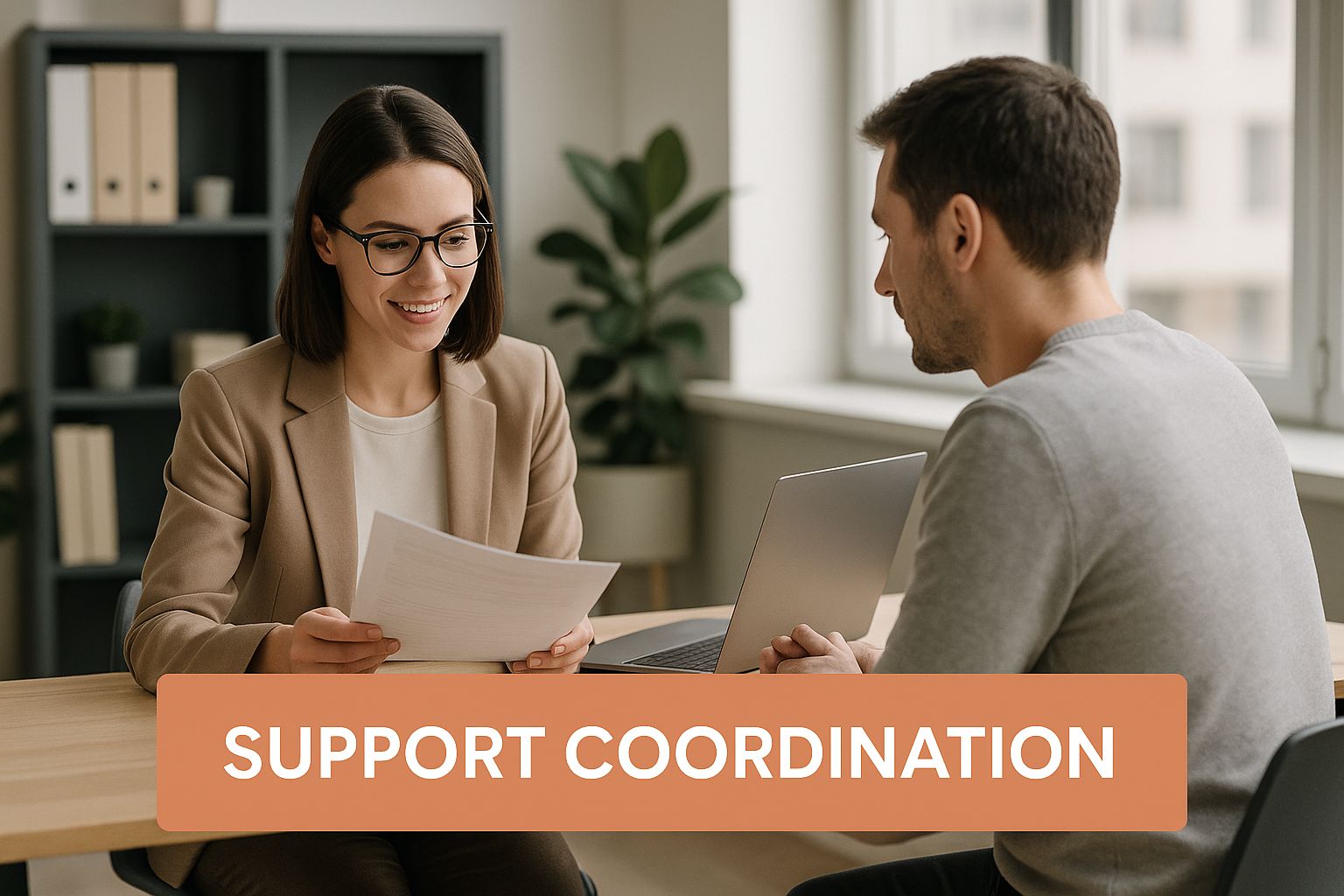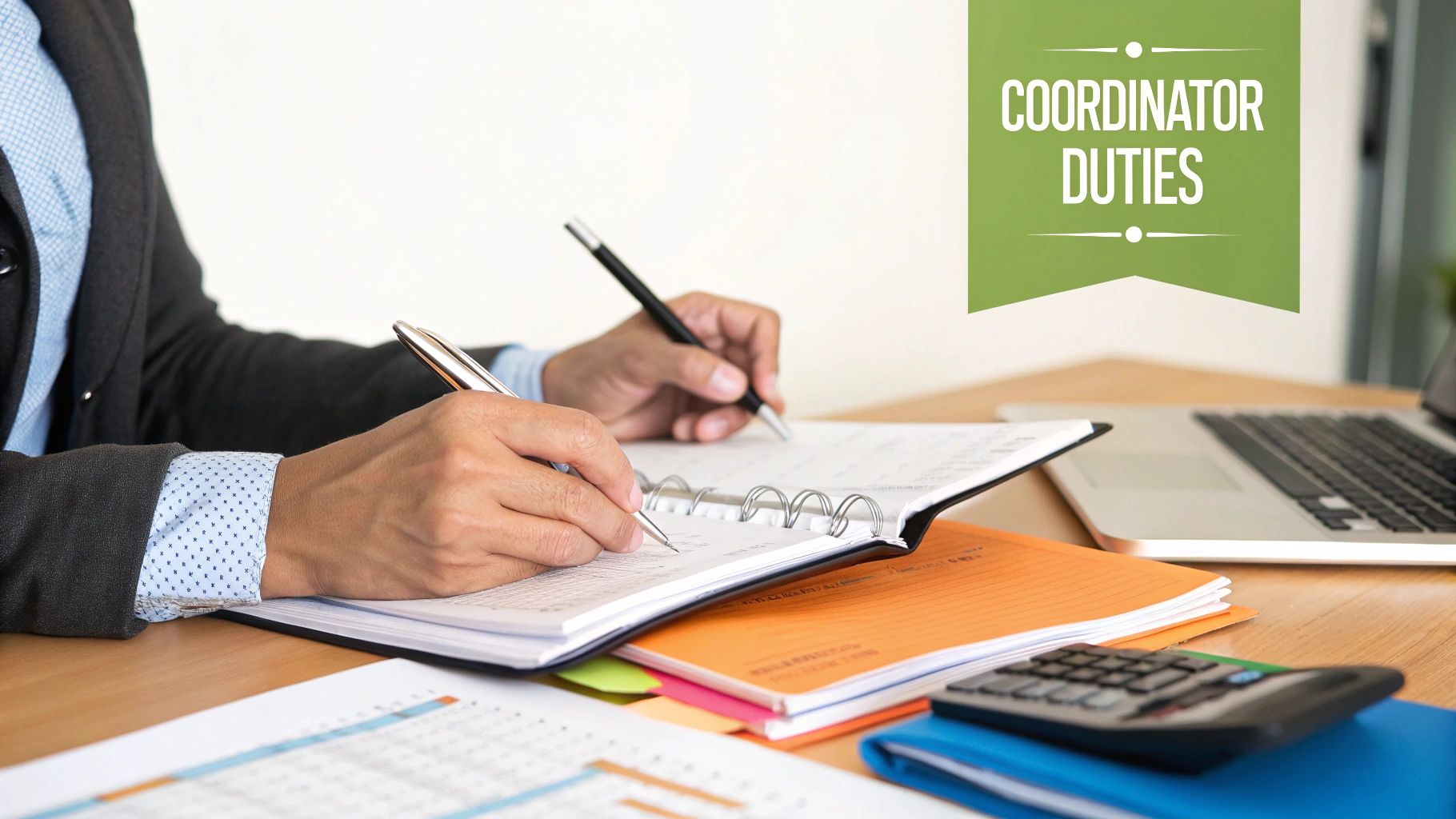What Does a Support Coordinator Do? An NDIS Guide
Imagine your NDIS plan is a map to a better life, but the terrain is new and a bit tricky to navigate. A support coordinator is the expert local guide who travels with you, pointing out the best paths, helping you understand the landscape, and ensuring you reach your destination.
They're essentially your NDIS strategist, dedicated to helping you bring your plan to life and achieve your personal goals.
So, What Exactly Does an NDIS Support Coordinator Do?
Getting started with the NDIS can sometimes feel like you've been handed a box of puzzle pieces without the picture on the lid. A support coordinator sits down with you to help figure out how all those pieces fit together to create the life you want. Their core job is to activate your NDIS plan, making sure you get the absolute most out of your funding.
But they do more than just give you a list of phone numbers. A great support coordinator gets to know you. They work alongside you to find providers that genuinely match your personality, your specific needs, and your long-term aspirations. This means they do the legwork: researching options, setting up meetings, and making sure any service agreements you sign are clear, fair, and in your best interest.
This image perfectly illustrates how a support coordinator becomes the central point of contact, connecting you with all the different supports in your network.

As you can see, they help orchestrate everything so your support network is a strong, cohesive team working for you.
Core Responsibilities and Purpose
The NDIS has a clear vision for this role. Support coordinators are there to help you understand and implement your plan. This is a hands-on role that involves:
- Connecting you with NDIS providers as well as mainstream community and government services.
- Building your confidence and skills to manage your own supports in the future.
- Helping you plan for unexpected events or crisis situations.
- Designing a mix of supports that is tailored just for you.
For a deeper dive into their specific duties, you might find our guide on what is support coordination helpful.
It's also crucial to understand how their role differs from a Plan Manager. People often mix these two up, but they have very distinct jobs. A support coordinator is focused on the practical side of things—finding services and building your capacity. A Plan Manager, on the other hand, takes care of the financial side, like paying your invoices.
Support Coordinator vs Plan Manager at a Glance
To clear up any confusion, here's a simple breakdown of who does what.
| Responsibility | Support Coordinator | Plan Manager |
|---|---|---|
| Primary Focus | Connecting you to supports and services. | Managing the financial side of your plan. |
| Key Tasks | Researches providers, helps with service agreements, builds your skills. | Pays invoices, tracks your spending, provides budget statements. |
| Main Goal | To help you implement your plan and achieve your goals. | To manage your NDIS funds and take care of the paperwork. |
Ultimately, both roles are designed to give you more choice and control over your NDIS journey, but they support you in completely different ways.
What Your Coordinator Actually Does Day-to-Day

Let's move past the formal job description and get into what a support coordinator really does. Think of them as the project manager for your NDIS journey. They’re the person who takes the goals written on paper and helps you bring them to life.
Their role is never the same two days in a row because it’s all about what you need. One day, they might be decoding the specific funding categories in your plan. The next, they could be on the phone, vetting local therapists to find someone who truly understands your situation.
Decoding Your Plan and Finding Providers
One of the first things a coordinator does is translate your NDIS plan into a clear roadmap. They sit down with you to make sure you understand exactly what your funding can be used for, how much you have, and how to make every dollar work towards your goals.
Let's say your plan has funding for 'Increased Social & Community Participation', but you’re not sure where to start. This is where your coordinator shines. They would:
- Chat with you about your hobbies and what you genuinely enjoy doing.
- Research local community groups, art classes, or sports clubs that align with your interests.
- Contact these organisations to check for things like accessibility, costs, and availability.
- Help you set up a visit or a trial session to see if it feels right.
This hands-on approach takes the stress out of endless Googling and phone calls. It means your funding is actually used for supports that make a real difference, letting you focus on the fun part—participating.
A support coordinator's role is not static; it constantly evolves based on feedback and systemic improvements. The NDIA continually refines the role to better serve participants, focusing on connecting people to supports, building their capacity, and monitoring outcomes.
Building Your Skills and Monitoring Progress
A truly great support coordinator does more than just make connections; they empower you. Their goal is to build your own skills and confidence so you can eventually manage your own supports if you wish. This could mean teaching you how to negotiate service agreements or showing you the ropes of the NDIS portal.
They also keep a close eye on your services to make sure they're working for you and helping you move closer to your goals. This involves regular check-ins and getting you ready for your annual plan review. This whole process is guided by a deep understanding of the support coordination framework, which the NDIS Commission continually refines through consultations.
If you’re looking for a team that puts these principles into practice, you can explore our approach to support coordination in Adelaide. The ultimate aim is always to build a support network that’s effective, responsive, and completely centred around you.
How a Coordinator Helps You Take Control

The real value of a great support coordinator isn't just about managing services or ticking boxes. It’s about putting you firmly in the driver’s seat of your own life. Their core purpose is to empower you, helping you move from feeling overwhelmed by a complex plan to confidently directing your own support network.
Think of it like learning to drive. At first, you have an instructor right beside you, guiding every turn. But with practice, you start making those decisions on your own. A support coordinator is like your NDIS instructor, building up your skills and confidence until you can navigate the system independently.
From Guided Support to Self-Advocacy
The journey starts with them right there with you. They help you make informed decisions, ensuring you understand the 'why' behind every choice. They don’t just find a provider for you; they teach you what makes a provider a good fit, so you'll know how to find one yourself next time.
This partnership is all about building your capacity in a few key areas:
- Decision-Making: They'll lay out the options, explain the pros and cons of each, and empower you to make the final call.
- Self-Advocacy: They help you find your voice, making sure you can clearly communicate your needs and preferences to providers.
- Problem-Solving: If a service isn’t working out, they guide you through the process of either fixing the issue or finding a better alternative.
If you're looking to dive deeper, you can find a lot of helpful NDIS guides and resources that expand on these topics.
The ultimate measure of a support coordinator’s success is when you feel so in control that you need them less and less. Their goal is to work themselves out of a job by building your independence.
At its heart, this empowerment is what support coordination is all about. It’s a temporary support designed to have a lasting impact, giving you the tools to manage your own plan and live life on your terms. A good coordinator knows their job is done when you can confidently say, “I’ve got this.”
Finding a Coordinator Who Is the Right Fit
Knowing what a support coordinator does is one thing. Finding the right one for you is something else entirely. This relationship is a genuine partnership, so finding a good match goes way beyond a list of qualifications on paper. It's about finding someone who really gets you and is committed to helping you build your vision of a good life.
A truly great coordinator is much more than just a service navigator; they become a trusted ally. You need someone who is a fantastic listener, a creative problem-solver for when things get tricky, and who has an intimate, on-the-ground knowledge of the local services in your area.
Beyond the Checklist
When you're looking for a coordinator, think about those "soft skills" that don't always show up on a resume. The best coordinators respect your goals, your way of communicating, and the pace you want to move at. They're there to champion your success on your terms, never pushing their own agenda.
The best support coordinator is someone who not only knows the system but also knows how to listen. Their ability to connect with you personally is just as important as their ability to connect you with services.
Their role is to work with you, your family, and your providers to build your confidence and independence.
Ultimately, the support coordinator role requires a unique blend of professional expertise and personal skill. You’ll often see position descriptions for this job calling for a strengths-based, person-centred approach. In plain English, that means their focus must always be on what you can do and on helping you direct your own supports. You can get a better sense of these professional standards in this detailed role overview.
Key Qualities to Look For
So, what should you really be looking for in this crucial partner? Keep an eye out for these essential traits:
- Exceptional Listener: Do they genuinely take the time to understand your goals before jumping to solutions?
- Creative Problem-Solver: When you hit a wall, are they resourceful enough to find another path forward?
- Local Knowledge: Do they have solid relationships and a deep understanding of the providers in your specific community?
- Respectful Communicator: Do they explain things clearly, making sure you feel heard and valued in every conversation?
Finding someone who embodies these qualities means you won't just have a coordinator—you'll have a real champion in your corner.
Actionable Steps to Choose Your Coordinator
Finding the right support coordinator is less about ticking boxes and more about finding a genuine connection. It's about trust, confidence, and a personality fit. This guide will walk you through the practical steps to find the perfect person to champion your NDIS goals.
A great starting point is the NDIS Provider Finder portal. You can use it to search for registered coordinators in your local area. Aim to create a shortlist of around three to five potential candidates who look promising based on their profiles and any listed specialisations.
Once you have your list, it's time to have a chat with each of them. Think of it less like a formal interview and more like a conversation to see who you click with. You're trying to get a feel for their personality and whether your communication styles will work well together.
Powerful Questions to Ask
To get the most out of your conversation, it helps to go in with a few questions ready. This will give you a much clearer picture of their approach, their experience, and how they handle the kind of challenges that can pop up.
- Can you tell me about a time you helped someone with goals similar to mine?
- How do you approach disagreements or solve problems with service providers?
- What does your process look like when we're getting ready for a plan review?
- How will we stay in touch, and how often can I expect to hear from you?
Listen carefully to their answers. They reveal a lot about how they work. More importantly, notice how they make you feel. Do you feel heard and respected?
What to Look For and Red Flags
As you talk, keep an eye out for green flags and be wary of any red ones. A great coordinator is an empathetic listener and a creative problem-solver. They should make you feel empowered and in control, never intimidated.
A critical part of the process is understanding the service agreement they will ask you to sign. This document outlines exactly what they will do for you and how they will be paid from your NDIS funds.
Be cautious if a coordinator seems rushed, brushes off your concerns, or makes promises that sound too good to be true. It's also vital that you are crystal clear on your rights and obligations, so take the time to understand your service agreements before signing anything.
Ultimately, trust your gut. The right partnership will feel supportive and collaborative right from the start.
Common Questions About Support Coordination
Stepping into the NDIS world often comes with a lot of questions, especially when it comes to the people who are there to help you. Let's walk through some of the most common queries we hear about support coordination, breaking them down into clear, straightforward answers.
A big one we hear a lot is: what happens if I’m not happy with my support coordinator? It's crucial to remember that you are always in the driver's seat. You absolutely have the right to change providers if the fit isn't right or you feel your needs aren’t being met.
The first step is simply to check your service agreement. Most will have a notice period, usually between two and four weeks, which just helps ensure a smooth handover without any gaps in your support.
How Is Support Coordination Funded?
The next question is almost always about the money. Support coordination is funded as a specific line item in your NDIS plan, tucked away under the Capacity Building support category.
Because it's a funded support, the NDIS provides a dedicated budget for it if it’s considered a reasonable and necessary part of your plan. This funding is completely separate from your other budgets. Using a support coordinator won't take money away from your therapies, assistive technology, or support workers. Think of it as an added resource, there specifically to help you get the most out of everything else.
Specialist vs Standard Support Coordinator
You might also come across the term 'Specialist Support Coordinator' and wonder how it differs from a standard one. While both are there to help you navigate your plan, a Specialist Support Coordinator is called in when things get particularly complex.
Here’s a simple way to think about it: A Support Coordinator is like a trusted project manager for your NDIS plan. A Specialist Support Coordinator, on the other hand, is the expert consultant you bring in for the most challenging parts of that project. They have deeper experience in managing situations that involve:
- Complex health or mental health needs.
- Working with other government systems like justice or child protection.
- Overcoming significant hurdles like homelessness or family breakdowns.
A Specialist Support Coordinator often acts as the "glue" that holds together a complex, multi-system team. They make sure every service—from your NDIS supports to mainstream services like hospitals—is working together seamlessly for participants facing major challenges.
The NDIS will decide if you need this higher level of support based on your individual circumstances. For most people, a great standard support coordinator has all the skills and know-how needed to make their plan a success. Reading through different client stories and experiences is a fantastic way to see how these roles play out in real life.
At NIR Navigator In Reach, we believe in providing clear, down-to-earth support and answering every question you have. If you're looking for a partner to help make your NDIS plan truly work for you, reach out to our team at https://navigatorinreach.com.
